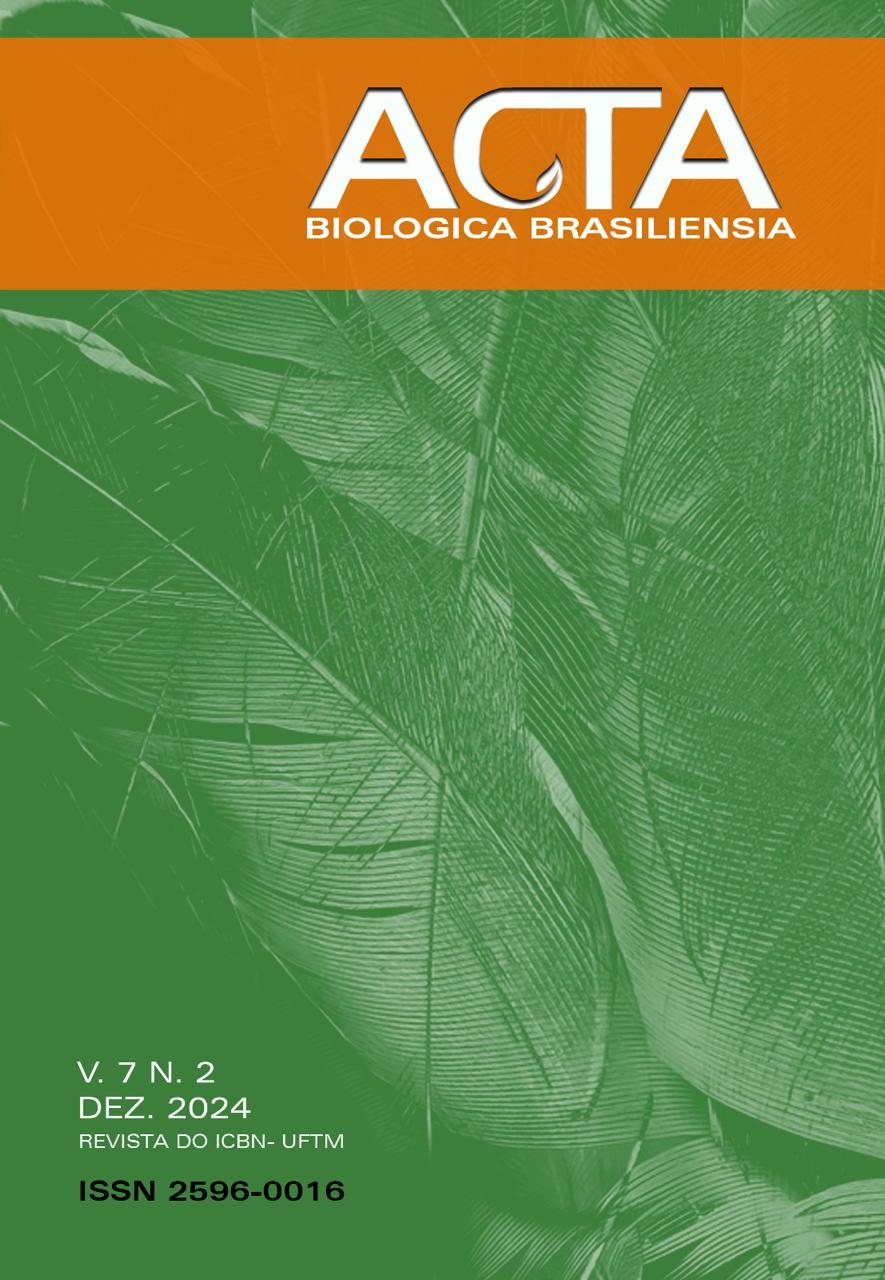APPLICATION OF SUSTAINABLE DEVELOPMENT IN SMALL-SCALE FAMILY FARMING TO MINIMIZE FOOD WASTE
DOI:
https://doi.org/10.18554/acbiobras.v7i2.7845Keywords:
Food utilization, Sustainable local development, Sustainable development goals, Natural resourcesAbstract
This study aimed to analyze the potential for sustainable development for family farming as an alternative for minimizing waste from the food produced. This qualitative and exploratory research, through a survey carried out in the Scopus, Web of Science and Scielo databases between 2017 and 2023, sought which methodologies allow family farming to establish a more sustainable food production system. The research provided important information about research into more sustainable food production models that aimed not only to generate income, but also to strike a balance between family farming and the environment. The methodologies that can be adopted by family farming must include the foundations of sustainability. These resources can range from simple practices to the adoption of sophisticated technologies in farmers' daily lives; which favors the implementation of a production model that is healthier for the environment. We conclude that the adoption of sustainable processing and methodologies that culminate in meeting the Sustainable Development Goals is a viable means for adequate use of the natural resources necessary to carry out the activity, allowing better use of the raw materials produced and consequently of the resources and ecosystems used.
References
Presidência República (Brasil). Lei Nº 11.326, de 24 de julho de 2006. Política Nacional da Agricultura Familiar e Empreendimentos Familiares Rurais. D.O.U, Brasília, DF, 24 jul 2006. http://www.planalto.gov.br/ccivil_03/_Ato2004-2006/2006/Lei/L11326.htm.
Ferreira LCG, Nóbrega SC. Agricultura urbana e soberania alimentar: uma reflexão sobre a importância das práticas socioambientais na grande Goiânia (GO). Revista GeoNordeste. 2019; 4: 129-150. https://doi.org/10.33360/RGN.2318-2695.2019.i3.p.129-150.
Silva GCC, Costa MEL. Identidade e representações sociais de jovens em assentamentos rurais da Zona da Mata de Alagoas. Interfaces Científicas. 2021; 9(2): 201-214. https://doi.org/10.17564/2316-3801.2021v9n2p201-214.
Tilman D, Clark M. Global diets link environmental sustainability and human health. Macmillan Publishers Limited. 2014; 515: 518-521. 2014. https://doi.org/10.1038/nature13959.
Ribeiro H, Jaime PC, Ventura D. Alimentação e sustentabilidade. Revista Estudos avançados. 2017; 31(89): 185- 198. https://doi.org/10.1590/s010340142017.31890016.
Shidhar A, Balakrishnan A, Jacob MM, Sillanpaa M, Dayanandan N. Global impact of COVID-19 on agriculture: role of sustainable agriculture and digital farming. Environmental Science and Pollution Research. 2023; 30: 42509-42525. https://doi.org/10.1007/s11356-022-19358-w.
Moro LD, Mazutti J, Brandli LL, Casagranda YG, Mores GV. Overcoming the challenges of sustainable family agriculture in southern Brazil: contributions to the 2030 agenda. Sustainability. 2022; 14. https://doi.org/10.3390/su14148680.
Cidon C, Theis V, Schreiber D, Haubert B, Fagundes C. Análise da agricultura orgânica na Região Sul do Brasil, sob a perspectiva da sustentabilidade. Revista em Agronegócio e Meio Ambiente. 2021; 14. https://doi.org/10.17765/2176-9168.2121v14Supl.1.e9420.
Empresa Brasileira de Pesquisa Agropecuária (EMBRAPA). Sustentabilidade e sustentação da produção de alimentos no Brasil: O papel do País no cenário global. 1. ed. Brasília: Centro de Gestão e Estudos Estratégicos; 2016.
Mariosa PP, Pereira HS, Mariosa DF, Falsarella OM, Benedicto DMCSC. Family farming and social and solidarity economy enterprises in the Amazon: opportunities for sustainable development. Sustainability. 2022; 14(17). https://doi.org/10.3390/su141710855.
Marangoni, SM, Filho TM, Mac-Lean PAB, Satolo EG. Práticas antiperdas na fase pós-colheita em uma cadeia de abastecimento de hortaliças. Revista em Agronegócio e Meio Ambiente. 2022; 15(4). https://doi.org/10.17765/2176-9168.2022v15n4e10015.
Gomes MDA, Costa RNT, Rojas GG, Oliveira, FTR, Nunes KG. Sustentainability of organic and conventional irrigated systems based on family farming. Irriga. 2021; 1(1): 14-29. https://doi.org/10.5809/irriga.2021v1n1p14-29.
Chebicka A, Pietrzak M. Size of Membership and Survival Patterns of Producers’ Organizations in Agriculture Social Aspects Based on Evidence from Poland. Sustainability. 2018; 10(7). https://doi.org/doi: https://doi.org/10.3390/su10072293.
Giagnocavo C, Gómez EG, Pérez-Mesa JC. Cooperative Longevity and Sustainable Development in a Family Farming System. Sustainability. 2019; 10(7). https://doi.org/10.3390/su10072198.
Durek M, Wrzaszcz W. On the Way to Eco-Innovations in Agriculture: Concepts, Implementation and Effects at National and Local Level. The Case of Poland. Sustainability. 2020; 12(12). https://doi.org/10.3390/su12124839.
Aguiar AA, Silva L, Parente C, Costas CA. Organizational innovation in the contexto of family farms: lean diagnosis. Journal of Innovation Management. 2020; 8(2): 68-86. https://doi.org/10.24840/2183-0606_008.002_0006.
Gervazio W, Bergamasco SMPP, Moreno-Calles AI, Yamashita OM, Rocha AM. Sustentabilidade e bem viver segundo os agricultores familiares do Projeto de Desenvolvimento Sustentável São Paulo, na Amazônia norte mato-grossense, Brasil. Revista de Economia e Sociologia Rural. 2023; 61(2): e255979. https://doi.org/10.1590/1806-9479.2022.255979.





